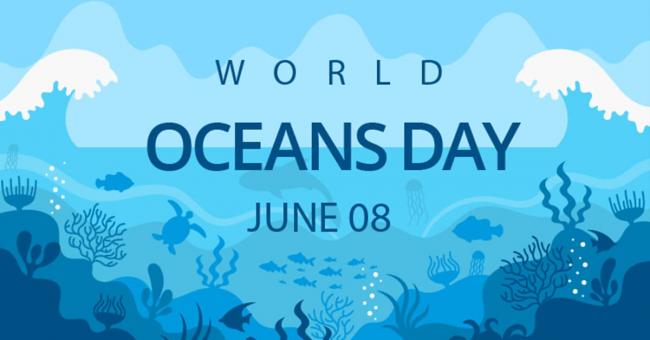World Ocean Day 2021: Marine Life Threatened by Toxic Waste

World Ocean Day 2021: The oceans we knew used to be substantially different from the ones we see now. They've become so filthy that they're no longer useable. Plastic may be discovered in the ocean's deepest depths. What exactly is the reason behind this?
All we see when we first wake up is plastic, and the bulk of the goods we use are made of plastic. We throw away a lot of plastic covers in our garbage. A large portion of this garbage ends up in the ocean. Many nations transport their garbage by ship and dump it in the oceans. Every day, tens of thousands of tonnes of garbage enter the seas in this manner. Plastic makes up for a majority of it. You're well aware of the difficulty of dissolving it in the ground. It kills fish and other creatures in the water. Those helpless creatures are perishing because there's no escape from the toxic water.
Plastic waste is causing havoc on the oceans as well. Today is World Oceans Day, and we can do out bit to reduce pollution if we can cut down the use of plastic.
World Ocean Day is celebrated every year on June 8. Let's look at what can be done to avoid ocean contamination. While we, as individuals, seek change, governments all around the world have been unable to make meaningful progress in this direction. Fish is consumed on a daily basis by humans. Aside from that, the sea supplies us with a number of benefits.
Without the sea, there would be no water on our planet. It isn't pouring outside. The rivers have dried up completely. The Dead Sea receives its name from the severe salinity of its water. This demonstrates that there is no water that isn't contaminated. As a result of our activities, we have found ourselves in this situation. If you want to save more water, consider the five factors listed below.
Switch to Reusable Bottles: Rather than purchasing new water bottles, you may reduce waste by reusing the ones you already have. Because most of these bottles end up in landfills as plastic garbage. As a result, we need to pay greater attention to this problem. If one is available, it is recommended to fill an empty bottle of water at any train station.
Reduce Your CO2 Emissions: Did you know that marine plants provide half of the oxygen humans breathe—A majority of the plants, though, are now dying. This is due to a variety of factors, including air pollution and water poisoning. If air pollution is decreased, plants can survive in water. So that there is more oxygen available to us.
Avoid Cosmetics that Harm the Ocean: For the sake of beauty, the cosmetic industry manufactures a lot of needless creams and lotions. It's all a waste of time. They generate a great deal of waste. They combine as microplastics in the air and water. That's what we're breathing in. They are eaten by marine organisms in the waters. They're poisoning the water. Every day, a variety of fish and other aquatic species die. As a consequence, wherever possible, it is recommended to use home remedies rather than such products.
Stop littering and clean up the beach: You'll notice how lovely the deserted beaches are. The trash is spread across people's favorite beaches. Many people bring attention to it and then forget about it. For the last 20 years, NGOs have been cleaning Mumbai beaches, yet there is still so much litter. Our beaches are in terrible condition. We can do a lot better by not throwing garbage into the water
Re-Usable Bags: opt for reusable bags instead of plastic covers. Hemp bags are the best option. They quickly blend in with the environment. As a result, there will be no pollution. This is something we've said before. However, the action is yet to happen.
Theme: This year's theme will focus on the life and livelihood that the ocean provides in the wake of the coronavirus outbreak. ‘The Ocean: Life and Livelihoods' is the theme for World Oceans Day 2021. The decision to keep the waters good and the wildlife good will help our cause. Seawater makes up 77% of the earth's surface. We, the trees, the animals, the birds, and the creatures are all safe if the water remains clean. All our efforts must be directed in that direction.




